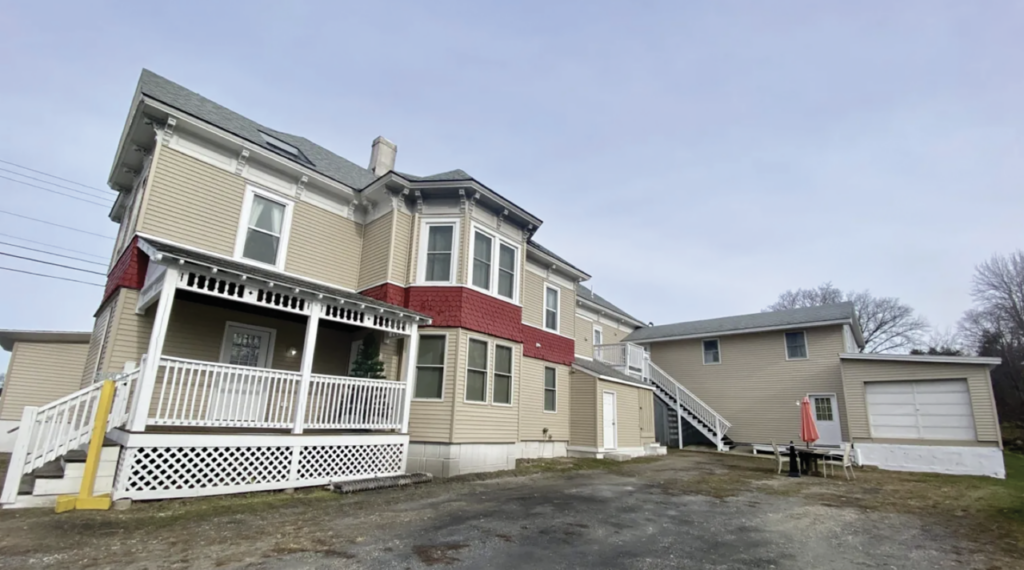
By Tiffany Tan/VTDigger
“Base Camp,” located on Rutland’s North Main Street, is made up of eight affordable housing units for military veterans.
By Tiffany Tan/VTDigger
A former bike shop was unveiled Tuesday, Nov. 21, as new residences for veterans who had experienced homelessness, a privately led project that officials said could help respond to Vermont’s housing crisis.
“” is made up of eight one-bedroom apartments on the ground floor of a three-story building along North Main Street in Rutland City. Since mid-October, seven military veterans have moved in, leaving only one unit unoccupied.
“It’s so modern,” said Douglas Lloyd, 61, a former service member, marveling at his bedroom’s remote-controlled ceiling fan with a light. “I can’t ask for anything more.”
Before moving into Base Camp in early November, Lloyd lived for two-and-a-half months at a home for unhoused veterans in Bradford. Now he has his own place in the city where he spent his childhood, and one with easy access to public transportation.
“I’ve had people support me all the way through,” Lloyd said. His monthly rent, including utilities, is about $1,000, half of which he said is subsidized through a program of the U.S. Department of Veterans Affairs. He pays for the rest with his disability insurance.
Lloyd found his new home with the assistance of the Veterans Affairs’ White River Junction Healthcare System, which has placed other former service members in rentals run by Base Camp’s owner and developer, Stephen Box.
Box said his partnership with the federal agency planted the idea that he could do his part to fill the existing housing gap if he converted Rutland’s former Col Cycling store into apartments for veterans.
“A lot of the veterans have had a turbulent housing history here in Rutland,” Box said ahead of Base Camp’s ribbon-cutting ceremony on Tuesday morning. “It’s our hope that this is permanent.”
The Vermont Housing Improvement Program supported the project with grants of $30,000 to $50,000 per apartment. In exchange, for at least five years the units must house people coming out of homelessness and be classified as affordable housing.
Box said he intends to make this a permanent housing arrangement for veterans. “They’ve already bounced around. I don’t want them ever to bounce around,” he said.
From planning to occupancy, Base Camp was completed in less than two years, according to its architect, Adam Pelkey of the McKernon Group. He said Box came to him with the idea of converting the one-time bike shop into multi-unit housing early in 2022. (Prior to Col Cycling, the building housed Mr. C’s Seafood restaurant.)
The entire housing project cost under $500,000, Box said. That included the grant funding, the owner’s required 20% funding match and incentives from the energy efficiency organization 3E Thermal.
With publicly supported affordable housing projects costing an average of $450,000 per unit, according to state officials, the construction of Base Camp is notable not just for its speed, but for its price tag.
“Oftentimes, a development is more expensive than what this project has been,” said Aaron Jones, home and rental repair coordinator at NeighborWorks of Western Vermont, which manages the Vermont Housing Improvement Program in the Rutland area.
A handful of factors helped to minimize the development cost of Base Camp, Jones said. They include the fact that the property had an existing electrical system and water service, he said, and the space was ready for retrofitting, as opposed to needing demolition work.
Cheryl Hooker, a member of Rutland’s Board of Aldermen and a former state senator, said the housing project can serve as a model for responding to the state’s lack of affordable housing.
“It can be done, and it doesn’t have to cost millions and millions. We don’t have to price ourselves out of existence,” said Hooker, who was among about 35 people — including Rutland-area state legislators, the Rutland mayor and other aldermen — who attended Tuesday’s ribbon-cutting ceremony.
According to recent state data, 753 households in Vermont were placed in a motel through the state’s emergency housing program. More than a quarter of the total beneficiaries, or 210 households, were in Rutland County.
Since Box’s family moved to Rutland from Los Angeles in 2021, Box said, he has acquired six rental properties with a combined 42 housing units. His current tenants, he said, include 15 adults and 19 children who were formerly housed through the state’s motel voucher program.
He believes red tape on every level of government stands in the way of responding quickly to the need for affordable homes in Vermont.
“It feels like there was a meeting where everyone got together and said, ‘How can we make this inefficient … How can we create obstacles to slow it down?’” Box said in an interview. “At the end of the day, based on results, are we housing people that need housing?”
Citing a 2023 report by the Rutland Regional Planning Commission, Box has repeatedly said that the county has 2,400 vacant homes, including ones that can be returned to the marketplace with minimal to no renovation work. Communities don’t have to create homes from scratch, he said.
“I don’t think there’s a housing crisis,” he said. “I think there’s a crisis of efficiency, a crisis of effectiveness, a crisis of collaboration, a crisis of creativity, a crisis of innovation, a crisis of urgency, a crisis of oversight, a crisis of commitment.”




